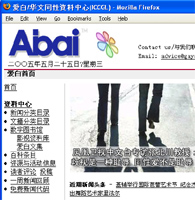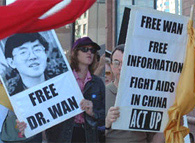It's not easy being gay in China.

The ban is a blow to the country's largely underground gay community as it was one of the most popular websites offering news, legal advice, social support and health education material, including safe sex practices considered vital for helping control the spread of HIV.
Prominent Chinese Aids activist, Dr Wan Yanhai says: "This site was a serious, dedicated information centre, like a Chinese news network. It became very influential, with many other sites quoting their reports."
The site's manager, Damien Lu, who is based in California, says, "It is known as one of the best sites for information in Chinese.
"Prior to being blocked, we had between 55,000 to 65,000 visits a day, and we estimate about 90 percent of these are from mainland China. In addition, our content is found on many other websites so the impact is far greater."
China routinely blocks websites it deems "subversive" - usually on the grounds they contain politically sensitive material - human rights issues, banned groups like spiritual movement Falun Gong or are pornographic. Last summer, the government launched a crackdown against websites it considered lewd, shutting down hundreds of local servers and blocking web sites that are hosted overseas.
Even search engine Google has been periodically banned.
Since dozens of other gay and lesbian websites from inside and outside China can still be accessed in the country it appears that in this case the government singled out gaychinese.net.
Lu says he has no idea why his site, which is hosted on a US server, was targeted.
"Till this day, we are not sure why. We have always been very careful in following Chinese government rules. There is no sexual or political content on our site. Prior to being blocked, we had been operating for close to six years," Lu says.
"We maintain an online library of writings that are submitted by web visitors but we have a team of editors to screen such submissions to make sure that the material does not contain any inappropriate content."
He added, "I know other GBLT (gay, bisexual lesbian and transgender) sites in Chinese language that have been banned but they are known to have anti-government or at least politically-sensitive content."
Activist Wan says the only controversial aspect to the site was that it was aimed at homosexuals.
The government pretends to the West that it is tolerant of homosexuality, but behind the scenes, Wan says, it tries to keep a tight grip on the community.
"The blocking of this website is a clear message from the government that it wants to show it is in control," he says.
Others say gaychinese.net may have been a victim of its own success - it was too far-reaching and influential for the authorities to let it survive in China.
Wan, founder of Aizhi Action Project, an NGO which promotes HIV/AIDS awareness and prevention, is no stranger to Beijing's tough arm.
He was expelled from his government post of health official in 1994, after he promoted equal rights for gays and lesbians and supported AIDS awareness. He has struggled to keep his organisation running in the face of official harassment. In 2002, Wan was detained for about a month after he released data on HIV sufferers in Henan province who caught the virus from a blood donation scam.

Dr Wan Yanhai (above), founder of Aizhi Action Project, is China's most prominent AIDS activist. In 2002, he was detained for about a month after he released data on HIV sufferers in Henan province who caught the virus from a blood donation scam.
While homosexuality is not illegal in China, it is still a taboo subject. It wasn't until April 2001, that the Chinese Psychiatric Association declassified homosexuality as a sexual disorder. In such a climate of discrimination many gays and lesbians are too afraid to come out to their family and friends. In April, a gay and lesbian film festival was shut down at Beijing University hours into the first program because of its "sensitive" theme.
Observers say authorities tolerate gay movements as long as they are not too vocal and that they generally have a better chance if they run under a safe sex and/or HIV/AIDS education banner.
Gaychinese.net is run by a group of volunteers, mainly inside China. According to Lu, none of them have yet been contacted by authorities.
But Lu is concerned about the ban because he said the site was a lifeline to gays in China. It offered information about safe sex, dealing with homosexuality and the mental and social pressures of being gay in the mainland. The site had an interactive resource where users could get information and advice.
"To many Chinese GBLT, particularly those in remote rural areas, this is a vital link for them to get accurate information that has profound impact on their lives," Lu said.
"Sometimes, this impact is literally a matter of life and death, as depression and suicide are among the problems that we help them deal with."
Although there many other gay and lesbian websites, none were as influential or serious as gaychinese.net, says Wan, adding that the site had started to be used by parents wanting to understand why their children were gay.
Most other sites simply host chat rooms and space for personal ads - which is still a valuable resource in a closed society where it is difficult to meet other gays and lesbians without the help of the net.
"There aren't many pure resource sites like ours," says Lu.
"Most web sites in China aimed at the GLBT offer content that is primarily entertainment."
Since the government typically does not comment on overseas sites it chooses to ban, Lu says he has no recourse to getting his site unblocked.
"We are at a loss as to what to do. There is no government agency that we can contact so we do not know if it will be lifted at all."
While Wan suggests fighting the ban, Lu says he can only wait and see if the authorities get a change of heart as they did last year when the site was blocked for about a week during a nationwide "cleansing" campaign.
Until then, Lu says: "Each day this site is down, some people's lives are being affected, particularly the young. We receive inquiry emails everyday from readers in China asking what happened or when the site would be restored."











 Printable Version
Printable Version











Reader's Comments
Be the first to leave a comment on this page!
Please log in to use this feature.